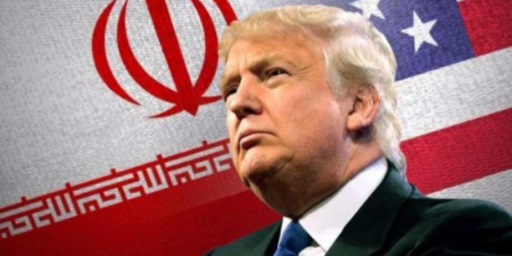Let’s Take a Breath on Iran
Bret Stephens (and others) are overreacting.

One phrase comes to mind in reading Bret Stephens’ column in the NYT (The Pirates of Tehran, subtitled “If Iran won’t change its behavior, we should sink its navy”).
That phrase is “useful idiot.”
Despite numerous caveats in the column, Stephens is just adding to an environment of heightened tension with Iran that the Trump administration is helping to create. Jumping to “we should sink their navy” before we fully understand what is going on in the Gulf of Oman is foolish escalation.
He starts off waxing nostalgic:
On April 14, 1988, the U.S.S. Samuel B. Roberts, a frigate, hit an Iranian naval mine while sailing in the Persian Gulf. The explosion injured 10 of her crew and nearly sank the ship. Four days later, the U.S. Navy destroyed half the Iranian fleet in a matter of hours. Iran did not molest the Navy or international shipping for many years thereafter.
Setting aside that an attack on an US naval vessel is a different ballgame altogether, is it too much to ask to take a breath before calling for a major provocation with Iran?
After noting that Trump is a known liar, the piece continues:
In this case, however, the evidence against Iran is compelling. CentCom’s account notes that “a U.S. aircraft observed an IRGC Hendijan class patrol boat and multiple IRGC fast attack craft/fast inshore attack craft (FAC/FIAC) in the vicinity of the M/T Altair,” one of the damaged tankers. The Iranian boats are familiar to the U.S. Navy after decades of observing them at close range. And staging deniable attacks that fall just below the threshold of open warfare on the U.S. is an Iranian specialty.
Trump might be a liar, but the U.S. military isn’t. There are lingering questions about the types of munitions that hit the ships, and time should be given for a thorough investigation. But it would require a large dose of self-deception (or conspiracy theorizing) to pretend that Iran isn’t the likely culprit, or that its actions don’t represent a major escalation in the region.
Well, first, let’s not pretend like the US military is infallible. Let’s also recall that both Secretary of State Pompeo and National Security Adviser Bolton are hardcore hawks on Iran.
We have been down the road of officials interested in pushing an aggressive agenda against a specific country far too many times to immediately jump to conclusions like sinking navies after only a few days.
Or, at least, we should be.
The entire Iranian situation feels more and more like the Pompeo/Bolton duo ramping up an excuse for military action (Trump gets a lot of credit, too, for unilaterally pulling out of the Iran nuclear deal). There is too much at stake to blithely go down that road and columns like this one grease the rails. Rhetoric like this from elite media helped us get into Iraq, let’s not forget.
This is actually an area wherein I hope Trump’s penchant for bluster over action, and instinctive opposition to significant military intervention wins the day.
However, Bolton and Pompeo have helped orchestrate a situation in which this kind of event could spiral out of control. The fact that the Saudis want a response is troubling, as it signals the potential for greater regional instability and conflict, and because Trump is likely to listen to the Saudis, rather than listening to the Europeans.






From the sinking of the Maine in Havana to the Gulf of Tonkin naval and maritime disasters have been used by evil men for sending men and boys into mistaken wars.
Mr Stephens writes reasonably intelligent things from time to time. This is NOT one of those times.
The useful idiot writes:
First, if we cannot even get our story together on what hit the ship, and whether it was flying or not, maybe we aren’t ready to be pointing fingers.
Second, multiple nations in the region have an interest in staging something like this and pointing fingers towards Iran. Not all conspiracy theories are wrong.
Third, we are now blaming Iran for dozens of random things throughout the Middle East, including things that others have taken credit for.
Fourth, even if this was Iran, it wouldn’t justify war.
The man is an idiot, and he is either being played or just a professional idiot. The NY Times did a piss poor job in the lead up to the Iraq War, and is just repeating it’s past mistakes.
It’s infuriating that so many of us predicted these kinds of events weeks ago, when Pompeo and Bolton started talking about their “intelligence” indicating “heightened threat levels” from Iran. The narrative is playing out exactly as we said it would, to box Trump into having to support military strikes.
All that’s missing is a plausible reason why Iran would engage in such suicidal behavior – a question Stephens calls a “minor matter”. He supplies his own answer: preposterous speculation that Iran “wants to demonstrate that Trump is a ‘Twitter Tiger'”. This evidence-free hypothesis is then used to justify demands to wage aggressive war on Iran.
The only consolation in all this is the extent of the scepticism on right-wing websites. It’s apparent not everyone has forgotten the disaster of Iraq 2003. I guess we’ll have to wait patiently to see what President Hannity decides to do.
Hmmmmmmmmm… I seem to recall quite a few lies coming out of the Pentagon over my 6 decades of life. Stephens must have a very selective memory. Besides, I’m pretty sure the CiC can order his generals to lie and that would not be considered an unlawful order.
Jus’ sayin’.
When I glanced and saw the term “Useful Idiot”… I thought “Trump?”
After all, his advisors are now mostly the same as under George W., and they were all known to have a desire to take on the middle east (either for a 21st century crusade or just to have ALL the oil… never quite clear on that).
So, advisors say: send the navy, send troops, be strong…. and then Trump says that we have no plans in Iraq (because, if you haven’t noticed, he has his hands quite full)… and then go figure, “something” happens to provoke America… when we were just minding our own business, outrageously heavily armed in international waters, doing nothing at all !!!
Our foreign policy has now gotten to the point of a 5 year old taunting a sibling with “I’m not touching them… I’m not touching them… I’m … Mom he hit me!!!”
I agree, some are itching for the US to hit Iran so badly they leap at every opportunity.
As an aside:
Bret, like so many of his ilk, believe the US responsible for everything. I suppose that is the way Americans have been conditioned to think for so long they do not question it.
A personal bugaboo of mine ever since the Somali (and other) pirates is what caused merchant ships to abandon all responsibility for protecting themselves? Why do modern shippers cling to the historically very recent notion that merchant ships shall have no means of defending themselves…or shouldn’t keep aboard enough personnel to stand watch…not even in the Straits? If somebody waltzed right up to that ship and attached two very visible mines to the topsides and nobody noticed…
@dazedandconfused: On the one hand, you raise a worthwhile point.
On the other, the truth of the matter is that the US does, in many ways, guarantee freedom of shipping lanes globally. Without the US’ hegemonic status, international trade would be more fraught and complicated.
@Steven L. Taylor:
True, but then again that fact may have just resulted in Iran attacking a Japanese tanker in order to goad the US. This is also fraught and complicated.
I would suggest the US may have become, through the election of ignorant buffoons as CIC’s in at least two of the last three elections, unfit.
@dazedandconfused:The issue is that merchant ships enter ports around the world. Those ports belong to countries that have wildly varying laws in relation to guns and such. There is a lot of legal issues involved and it’s something shipping companies don’t want to bother with.
So the current means of dealing with the Somali pirates is via contractors who board the vessel at sea and leave also at sea. The contractors and weapons are kept on ships in international water when they aren’t actively guarding a merchant vessel.
@Matt:
I am aware of that, but times have changed. There are “pirates” once again, as there has been through the vast majority history of merchant shipping.